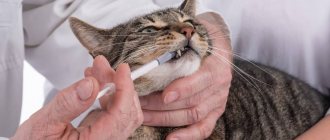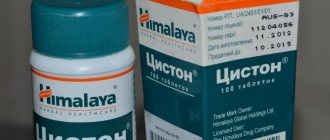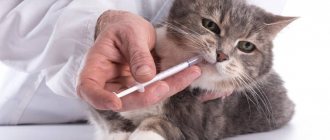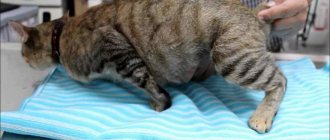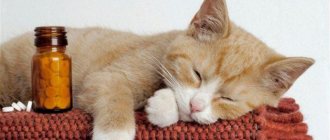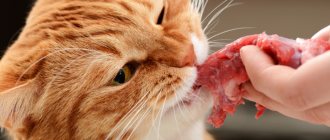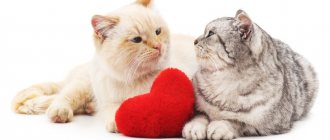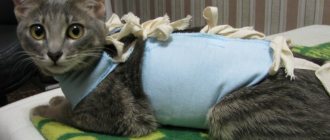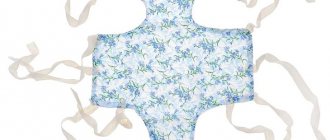Composition and release form
1 ml of Prazicide contains the active ingredients: praziquantel - 1.5 mg, febantel - 15 mg, pyrantel pamoate - 15 mg, as well as excipients. Externally, Prazicide is a light yellow suspension. During long-term storage, separation may occur, which disappears when shaken. The drug is sold in 5 mm polymer bottles with screw caps. The cardboard box contains a dispenser syringe and stickers for the veterinary passport.
The drug Prazicide effectively destroys helminths in the body of kittens.
Effect of the drug
The deworming suspension has a wide spectrum of active effects against any stages of development of tapeworms and roundworms that parasitize kittens:
- Praziquantel improves the permeability of cell membranes for easier penetration of Ca ions, while simultaneously inhibiting fumarate reductase (an enzyme of the parasite), which leads to paralysis of the parasite.
- Pyrantel pamoate blocks neuromuscular transmission, impairs the permeability of cell membranes, and inhibits cholinesterase, which contributes to paralysis and subsequent death of the helminth.
- Febantel inhibits fumarate reductase, which disrupts the absorption of glucose and the synthesis of the tubulin protein, due to which the microtubular apparatus of helminth cells is destroyed and the parasite dies.
After administration, praziquantel is quickly absorbed into the gastrointestinal tract and reaches a high concentration in the blood plasma within 1-3 hours. The substance is then actively distributed in the kitten’s tissues and excreted from the body in the urine during the day. Pyrantel pamoate acts longer due to difficult absorption in the gastrointestinal tract and is excreted in feces.
The mechanism of action of the drug is based on the effect on the neuromuscular activity and metabolism of helminths. The optimally selected composition of active substances guarantees low toxicity of the product for pets.
The components of the drug Prazitel paralyze helminths and promote their removal from the body.
How to choose a medicine to fight internal parasites
You need to approach the selection of treatments for your pet carefully, taking into account not only the convenience of their use, but also his health condition and age. Not all drugs are suitable for kittens, pregnant and lactating cats. It is also necessary to take into account chronic diseases, intolerance to any substances and a tendency to allergic reactions.
Drugs that affect only one type of helminth are less toxic, act faster, and are more effective, but to use them you need to know exactly what your pet is infected with. If you have not previously had an analysis done at a veterinary clinic, then it is better to choose a complex treatment. You choose the type of medicine based on ease of use and its cost.
Pills
The tablet is one of the time-tested dosage forms that is also used to treat pets. It has some advantages over other means:
- anti-worm tablets are produced based on a certain weight of the animal (this item must be prescribed in the instructions for use), so the exact dosage of the drug is easy to determine;
- This medicine is easily divided into parts; if necessary, it can be crushed and mixed with food or drink for the cat;
- many manufacturers, taking into account the characteristics of consumers, produce fish or meat flavored products;
- The tablets have a long shelf life and do not require special conditions.
The disadvantages include the fact that in case of allergic reactions to any components of this product, the effect of the tablet cannot be canceled. In severe cases, you need to go to the clinic.
Video: how to give a pill to a cat
Table: the most popular deworming tablets
| Drug name | Manufacturer | Active ingredient and its quantity in one tablet | Limitations in use | Frequency of application to achieve a therapeutic effect | Against what parasites | Price |
| Milbemax | French | Active substances:
Excipients:
|
| One time | Combined effect against nematodes (roundworms) and cestodes (tapeworms) | Packaging of tablets for kittens - from 315 rub. For cats - from 360 rub. |
| Drontal | German company Bayer HealthCare AG | Main components:
Auxiliary:
|
| One time | Combined anthelmintic effect on round and tape parasites | From 252 rub. |
| Febtal | Russian (AVZ) | The active substance is fenbendazole in an amount of 150 mg. Other components:
|
| Apply once a day for three days in a row | Anthelmintic effect on round and tape parasites living in the gastrointestinal tract and lungs | From 97 rub. |
| Azinox | Russian (AVZ) | The active ingredient in this drug is praziquantel (50 mg per tablet). The following are used as auxiliary ones:
|
| One time | Tapeworms at all stages of development | From 63 rub. |
| Prazicide | Russian | Composition of main substances:
Excipients:
|
| One time | Complex anthelmintic treatment against tapeworms and roundworms | From 94 rub. |
Photo gallery: deworming tablets
Drontal is a low-toxic, absolutely safe anthelmintic drug for cats and kittens from three weeks of age.
Febtal is a broad-spectrum anthelmintic agent
Praziquantel in Azinox is a very effective drug that paralyzes and kills parasites in any growth phase
Prazicide tablets are prescribed not only to adult cats, but also to kittens whose age exceeds 3 weeks
The anthelmintic for cats Milbemax contains two main components: milbemycin oxime and praziquantel.
Anti-worm suspensions
Suspensions, like tablets, are among the most popular means of combating internal parasites. They are also effective, but their effect on the pet’s body is considered milder . In addition, a liquid product is easier to get your cat to swallow, especially if it tastes good, so treatment will be less problematic.
Usually the packaging is equipped with a dispenser to accurately determine the amount of medicine. At the same time, the dispenser serves to introduce the product into the cat’s mouth.
The disadvantages of the suspension include a limited shelf life after opening the package.
How to administer the medicine
Like other oral dewormers, the suspension is best given in the morning before or at the same time as feeding. In this case, excess food in the stomach will not affect the effect of the medicine. Before administration, the suspension must be shaken well and only then use the dispenser to withdraw the required volume of liquid.
Next you need to proceed as follows:
- The cat is picked up and calmed (if necessary, swaddled).
- Press on the corner of the mouth so that the pet opens its mouth.
- There is no need to spray the medicine directly onto the tongue; it is better to spray it behind the cheek or on the root of the tongue.
- Then you can scratch your throat a little. Then the cat will quickly swallow the liquid.
Immediately after administration of the drug, strong salivation is possible. This is considered to be within normal limits.
Video: how to give a kitten a deworming suspension
Table: modern medicines for worms in the form of a suspension
| Name | Active substance | Against what worms | Frequency of application | Price |
| Celandine |
| Immature and sexually mature internal parasites, including:
| One time | Suspension for cats (5 ml) - from 80 rub. |
| Prazicide |
| Tapeworms and roundworms at any stage of their development, parasitic in the intestines | To combat nematodes, the drug is used once. To get rid of flatworms, including cucumber tapeworm, you need to use the medicine for three days. | Product for kittens - from 105 rubles, for cats (7 ml) - from 105 rubles. |
| Dirofen |
Auxiliary components:
| Sexually mature forms of round and flat worms and their larvae | One time | The drug for cats (7 ml) - from 135 rubles, for kittens (6 ml) - from 134 rubles. |
| Dironet |
Excipients:
| Adult tapeworms, roundworms and some types of larvae | One time | Suspension for kittens - from 162 rubles, for cats (10 ml) - from 143 rubles. |
| Helminthal |
The following are used as excipients: | All forms of nematodes and adult cystodes | One time |
|
It is recommended not to use all these means:
- for kittens less than three weeks old;
- in case of individual intolerance to components;
- cats in the first half of pregnancy (three weeks before birth, deworming is carried out under the supervision of a veterinarian);
- lactating cats the first three weeks after birth;
- sick and exhausted animals.
Photo gallery: deworming suspensions for cats
Suspension for cats Prazicide is a non-hazardous type of medicine, but before giving it to your pet, we advise you to familiarize yourself with the rules for its use
Diroven has a wide spectrum of anthelmintic action. Dironet suspension is available for cats with salmon flavor
Celandine suspension is a combination of 2 active substances against worms
Helminthal is effective in the treatment of mixed cestode-nematode infestations, eliminates most tapeworms and roundworms
Drops on the withers for worms
The advantage of this deworming remedy is its ease of use. Not every cat can be fed tablets or suspension without loss. And the drops are simply applied to the animal’s skin and do not cause him any unpleasant sensations. It is only necessary to take measures to prevent the cat from licking the medicine from its fur, as this can cause poisoning.
Drops are sold in pipettes designed for single use. You just need to smooth out the fur and apply the product to the skin. The dosage is determined strictly according to the instructions, taking into account the weight of the pet. Typically, drops are applied to places that are inaccessible for licking:
- occipital part of the head;
- neck;
- part of the back between the shoulder blades (withers).
The animal's skin should be healthy and dry. You should not bathe your pet for several days before using deworming drops and two to three days after.
If you have several cats living in your home, they will have to be isolated from each other for several hours.
Table: deworming drops for cats
| Drug name | Manufacturer | Composition of the drug | What parasites is the action directed against? | Features of application | Price |
| Profender | German company Bayer Animal Health GmbH | Active ingredients:
Auxiliary:
| Tapeworms and roundworms in all forms of development | Drops can be used for kittens older than eight weeks |
|
| Helminthal | Russian |
| Larvae and mature individuals of nematodes and cystodes, as well as sarcoptoid (skin, including parasitic in the ears) ticks and fleas | Drops are prescribed for kittens from seven weeks of age | Drops for cats weighing less than 4 kg - from 172 RUR. Drops for cats 4–10 kg - from 410 rub. |
| Advocate | German company Bayer Animal Health GmbH | Active ingredients:
Auxiliary:
| All forms of roundworms, fleas and sarcoptic mites. Can be used to treat dermatitis in cats caused by flea bites. | Can be used for kittens from 9 weeks of age | Pack of three pipettes for cats up to 4 kg - from 1600 RUR. Pack of three pipettes for cats 4–8 kg - from 1346 RUR. |
| In-Up | Russian | Active ingredients:
Auxiliary:
|
| Kittens can be treated with this remedy starting at two months. | Packaging costs from 202 rubles. |
| Dironet | Russian | Active ingredients:
Auxiliary:
|
| Allowed for kittens from 2 months of age | Packaging for three pipettes - from 310 rub. |
Like other deworming remedies, drops are not used:
- for small kittens;
- in case of individual intolerance to components;
- animals with infectious or chronic diseases;
- emaciated animals.
Use in cats during pregnancy and lactation only under the supervision of a veterinarian.
Photo gallery: types of deworming drops for cats
The main advantage of Helmintal is treatment against all parasites at one time
Advocate drops for cats are characterized by high efficiency, ease of use, and no side effects.
Dironet will quickly and effectively rid the animal of all types of helminths and external parasites
Profender drops for cats against worms are a broad-spectrum external preparation
The drug In-Up provides long-term (up to 2 months) comprehensive protection of animals from parasites
Other means of combating worms
Pastes are very close to suspensions in terms of method of application and effectiveness . They differ only in the consistency of the drug. The pastes are also administered using a dispenser into the cat's mouth. The most popular product in this category on the market is Dirofen-paste 20. It has the same composition of active substances as the suspension. The restrictions on use are the same. It is more convenient to mix the paste with solid food; it has no other advantages.
It is more convenient to mix helminth paste with solid food
Indications for use
If your kitten is stunted, gets tired quickly and suffers from digestive problems (constipation, diarrhea, bloating), it is possible that he has worms. A kitten can become infected with worms even if it does not go outside at all. Not only raw meat and fish serve as a source of infection, but also dirt from the owners’ shoes that come from the street and even flies that kids love to hunt for. Also, cats themselves can transmit helminths to their cubs through milk.
Cats are parasitized mainly by 2 types of worms: round and tapeworms. They can cause severe harm to a developing organism. Worms feed on blood and lymph, take vitamins and nutrients from a small animal, depleting its body. Worms produce toxins that cause intoxication, which can lead to frequent allergic reactions in your pet. You can remove parasites from kittens with anthelmintics. High-quality, broad-spectrum drugs suitable for his age will destroy both roundworms and tapeworms.
Types of worms found in cats
Helminthiasis is a group of diseases caused by helminths (worms). The type of helminthiasis depends on which parasite has entered the body:
- Roundworms (nematodes). They live in the small and large intestines and feed on the blood of the carrier, therefore they cause anemia, but can cause general intoxication of the body or lead to allergies. A sick pet may experience bouts of vomiting blood, bloating, and possible sudden weight loss.
- Tapeworms (cestodes). The most common tapeworms of this species include cucumber tapeworm and echinococcus, which live in the stomach. The cucumber tapeworm is dangerous due to its size (in cats it usually grows up to half a meter). As it grows, it can damage the walls of the gastrointestinal tract. Echinococci are more dangerous for both domestic animals and humans. Their intermediate form develops in any organ of the host, causing damage.
- Trematodes (flukes). These worms parasitize the bile ducts of the liver (sometimes the pancreas), but their larvae can infect the intestines, lungs, or other organs. Therefore, the symptoms of the disease may vary.
Symptoms of helminthic infestation in a cat
Signs of helminth infection may include the following symptoms:
- loose stools;
- constipation;
- alternating loose stools and episodes of difficulty defecating;
- vomiting - sometimes even with blood and worms;
- in feces and on the hair around the anus - fragments of helminths or whole individuals;
- “riding” on the butt caused by itching;
- stool mixed with bloody and mucous components;
- bloated belly;
- weight loss;
- loss of appetite or uncontrollable bouts of gluttony;
- cough;
- difficulty breathing;
- pathological shedding;
- growth retardation in kittens;
- increased fatigue;
- icterus (yellowness) of the mucous membranes, sometimes their pale color (with anemia);
- convulsive syndrome and paralysis of the hind legs;
- spontaneous abortion of embryos or untimely birth.
You just need to keep in mind: if you have not visually confirmed the presence of parasites in your pet, similar symptoms may accompany other diseases. Treatment for deworming that is not supervised by a veterinarian can worsen the health of your pet. Before using medications, it is advisable to undergo tests and consult with specialists.
Video: how to tell if your cat has parasites
Instructions for use
Prasicide should be given to the kitten orally once in the morning with food or injected into the root of the tongue with a syringe. The dosage is calculated according to body weight: 1 ml of the drug per 1 kg of kitten weight. The bottle should be shaken well for one to two minutes before use. No preliminary preparation is required.
The drug Prazicide is poured into the kittens' mouths in the dosage prescribed in the instructions.
If the suspension is administered prophylactically, it is enough to give the drug once every 3 months and before vaccination. If the use of the drug is due to the presence of parasites, then in case of severe helminthic infestation, the drug should be given again after 10 days.
For preventive and therapeutic purposes when keeping kittens in groups (in nurseries, etc.), treatment should be carried out 2 times with an interval of 2 weeks. For nematodes, treatment is carried out once; for cestodes or mixed nematodo-cestodes, the kitten should be treated once a day for three days in a row.
Basic scheme
1. Prepare a syringe with medicine.
The liquid medicine is given in a syringe without a needle.
The syringe is usually calibrated in milliliters. Remember that 1 milliliter is 1 cubic centimeter. A teaspoon will contain about 5 milliliters of liquid.
2. Fix the cat.
You need to take the cat on your lap so that she cannot scratch you. You can wrap the cat in a blanket or towel and open its mouth slightly. To do this, place your thumb and thumb behind the fangs and push the cat's jaw apart.
It is important that the cat's head is raised up when swallowing, otherwise she will spit out the medicine by shaking her head. The head should not be thrown back, otherwise the cat may choke. Fixation of cats
3. We give medicine.
Then place the syringe in the corner of the cat's mouth behind the fang.
Slowly pour the contents of the syringe into the side of your throat. There is no need to rush - the animal may choke. Inject no more than a milliliter of solution at a time, about a quarter of a teaspoon, and allow the cat to swallow in between to prevent it from choking.
When the medicine in the syringe runs out, close your cat's mouth. Wait, she must swallow everything, otherwise the cat may simply spit out the medicine. If after this you remain unharmed, you can stroke the cat's neck towards the esophagus. This stroking helps to swallow the medicine.
4. Calm the cat.
If possible, after the procedure the cat should be calmed, petted and given treats.
Side effects and contraindications
Prazicide is well tolerated by animals and is even liked by them due to its pleasant sweet taste. Individually, kittens that are sensitive to any component of the drug may experience allergic reactions. If a reaction occurs, the kitten is given antihistamines.
Prazicide is contraindicated in emaciated animals and kittens under 3 weeks of age.
In case of an overdose, a kitten may experience the following conditions:
- refusal of food;
- heavy salivation;
- gastrointestinal disorders.
If these symptoms occur, detoxification treatment is required.
It is not recommended to treat kittens under three weeks of age for worms. It is worth waiting until complete recovery if the kitten has an infectious disease, has not fully recovered, or is too exhausted. If an animal has shown hypersensitivity to the drug, Prazicide should no longer be given. You should also refrain from using the drug if you are being treated with piperazine derivatives or other drugs that inhibit cholinesterase.
Possible side effects
Immediately after the cat consumes the suspension, it exhibits:
- increased salivation;
- foam comes from the mouth;
- Tears are rolling from my eyes.
In case of an overdose of a medicinal substance, the animal:
- becomes lethargic and drowsy;
- refuses food;
- tries to vomit food and taken medication.
The cat's temperature rises, redness appears on the skin, and stool becomes loose and frequent. The severity of side effects depends on the amount of the substance consumed. Pedigree cats experience the negative effects of antihistamines several times more often than ordinary domestic cats.
Helminthal
Important! Individual intolerance to individual components of the drug occurs more often. The treatment of such a cat should be trusted exclusively to a professional.
Storage conditions and shelf life
Prazicide should be stored in a dry place, protected from direct sunlight, at a temperature of 0-25 ºС. The suspension must be inaccessible to animals and children. Do not leave the suspension near food and feed. The shelf life of the medicine is 2 years.
Important. Worms in kittens are not only a problem for pets, but also pose a serious threat to human health. Toxacorosis and echinococcosis, migrating throughout the human body, can enter organs, causing pathologies. Children are at greater risk than adults, as they are more willing to communicate with pets. They are much more likely to become infected. Therefore, antihelminthic prophylaxis must be carried out every quarter - once every three months.
Reviews from cat owners and veterinarians
Cat owners and veterinarians recommend Prazicide for kittens.
Anna Petrova. I have 2 Norwegian Forest kittens. There was a suspicion that they had worms. I treated both of them with Prazicide according to the instructions. Both of their worms came out within 24 hours. It turned out to be a very effective remedy. She gave it with a dispenser, which was attached to the suspension, pouring the medicine deep into the root of the tongue. Both kittens practically did not notice the treatment. Nothing has changed in behavior or appetite. I recommend Prazicide because I myself have verified its effectiveness and safety.
Elena Bolotova, veterinarian. I constantly remind my patients of the need to worm their patients. Once every 3 months, it is imperative to give kittens an anthelmintic. A kitten can become infected with parasites even from dirt from shoes brought from the entrance. I recommend Prazicide, since the vast majority of clients then talk about its effectiveness.
Boris Dashchenko. My wife and I have a family of Don Sphynxes. There have already been 3 litters - we carry out preventive treatment for helminths at about 4 weeks. No consequences or side effects were ever observed.
Pirantel suspension for worms
- 1 General information
- 2 Instructions for use 2.1 Indications for use of the medicine 2.1.1 Hygiene rules
According to the World Health Organization, about 99% of children are infected with worms. "Pyrantel" syrup is an effective means of getting rid of helminths in young patients. The disease begins to manifest itself with symptoms similar to other ailments. These may be allergic manifestations and fatigue, irritability, and frequent bronchitis.
It is not always possible to understand in time that a child is infected with worms. Therefore, children, especially younger ones, need Pirantel. The suspension can be given for both treatment and prevention. Preventive measures for this disease are recommended to be carried out once every six months - in spring and autumn.
General information
The medicine "Pyrantel" contains pyrantel pamoate 250 mg in 5 ml. The active substance is practically not absorbed from the gastrointestinal tract into the blood - 93% is excreted unchanged in feces, so side effects are minimal. A small part is transformed in the liver to an inactive metabolite, which is excreted in the bile. About 7% is excreted in the urine. Of the additional substances, it is important to pay attention to the presence of sucrose, caramel coloring, chocolate flavoring and ice cream flavoring. The taste and composition of the suspension are pleasant to children.
When parents suspect that their child is suffering from a helminthic infestation, it is necessary to contact a doctor (pediatrician or infectious disease specialist), who will recommend Pirantel to the child, correctly calculate the dose, how many days to take the medicine, and prescribe a repeat dose. It is necessary to strictly follow the prescribed prescription.
Return to contents
Instructions for use
Indications for use of the drug
The drug is effective against ascariasis.
"Pyrantel" is indicated for children from 6 months. But it can be taken with caution up to six months of age. Adverse reactions rarely occur after taking the medication, even in infants. A liquid preparation is very convenient in this regard. The drug helps with infection with roundworms, pinworms, necator, hookworms, and trichocyngeloidids. Pinworm infection (enterobiasis) is a widespread and contagious disease. Therefore, it is better to treat with the drug in all family members and pets. For adults, in this case, it is necessary to use “Pyrantel” in tablets (when taken, chew thoroughly or dilute in water). Drops that can be purchased at veterinary pharmacies are suitable for pets. After completing the course of treatment, it is necessary to take repeated tests for worm eggs.
Treatment is not always effective. This does not mean that Pirantel does not help for children. This happens because Enterobius vermicularis at a certain stage lays eggs in the folds of the anus, causing itching. From there they can go anywhere. When scratched, they remain on the hands and under the nails. And then they enter the body again, and re-infection occurs. Therefore, during treatment, namely 3 weeks (that’s how long parasites live in the environment), you should strictly observe hygiene.
Children's ascariasis is common and requires the use of "Pyrantel" in suspension. Parasites are not transmitted from person to person, so treatment of others is not carried out. Unfavorable conditions outside the human body have a negative effect on the helminths Ascaris lumbricoides and they die (only if they do not get into the soil). No sanitary regime required.
Return to contents
